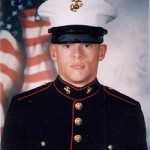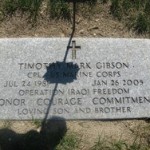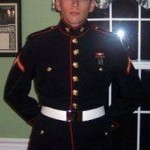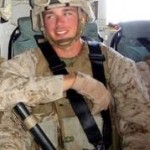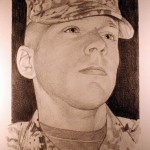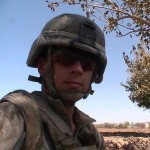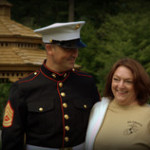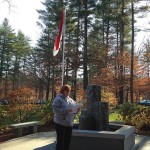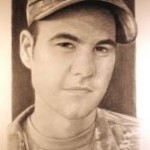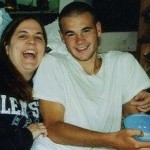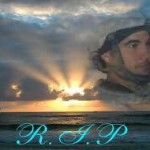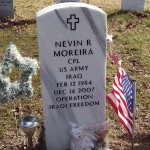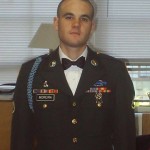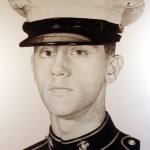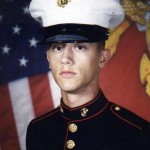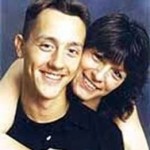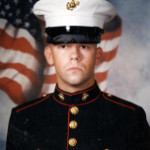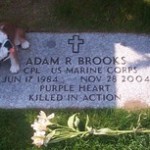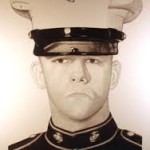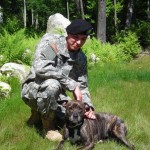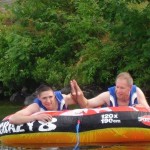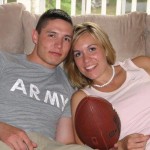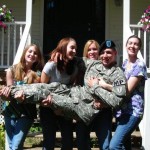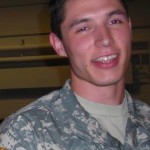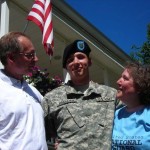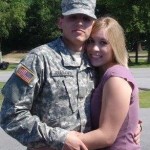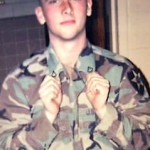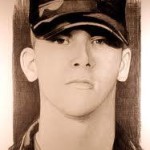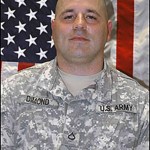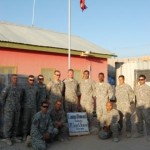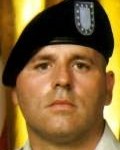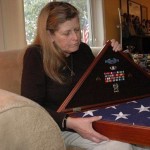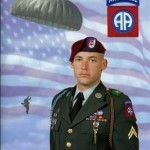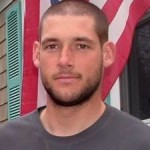Honoring and Remembering CPL Timothy Gibson
Honoring and Remembering CPL Timothy Gibson – Operation Iraqi Freedom – 1st Battalion, 3rd Marine Regiment, 3rd Marine Division, III Marine Expeditionary Force. KIA January 26, 2005
Sharing this from his mom, Elaine:
Tim liked people and they certainly adored him. He was never happier than when with friends and family, laughing and having a great time together. Tim was not only a brother to Tom and Patrick but also a good friend. They both looked up to Tim.
Tim always took care of those not able to stick up for themselves, being the protector to many youngsters in school. He once tot in trouble for ‘physical contact’ in grade school. When the principal found that Tim was defending a friend who being picked on, Time was exonerated. In middle school, some boys took a baseball cap from a special needs student and Tim waded right in there and took it back. In high school, a friend and Tim saved a young girl who was trying to commit suicide.
Tim excelled in sports, being the quarterback for three years and captain of the football team his senior year. He also was the centerfielder and captain of the baseball team. Tim led those athletes on and off the field. He always stopped to help the underclassmen who were struggling on the field and kept them true to their pledge of conduct.
Tim was a friend to all – teachers, coaches, athletes, non-athletes, parents of his friends—everyone had a soft spot for him. He was hard to resist with the grin of his and those blue eyes sparkling with mischief.
In the Marines, his men also looked up to him and the letters we have received from him Marine brothers speaks of a leader, serious in his duty, a good man who never had a bad word to say about anyone. His officers sent wonderful letters telling of a “Squared Away Marine”. “The Marine Corps does not build character, the Corps reveals it.” Tim’s heart was the Marines.
To remember is to honor….
Always remembered – LCpl Michael Geary
Always remembered – LCpl Michael Geary – KIA 12-8-10. As you watch this tribute, please keep his mom-Nancy, family and friends in your prayers. May God be with them and give them comfort, especially today.
He was assigned to 2nd Battalion, 9th Marine Regiment, 2nd Marine Division, II Marine Expeditionary Force, Camp Lejeune, N.C.; KIA Dec. 8, 2010 in Helmand province, Afghanistan, while conducting combat operations.
Michael Geary was so proud to be a Marine he wore his dress uniform to show his Pinkerton Academy English teacher after he completed training.
Michael, a 20-year-old from Derry, NH, joined the Marines after he graduated from Pinkerton in 2009 and had risen to the rank of Lance Corporal. He had started training to be a Marine when he was 14 by running and working out with his recruiters. Being a Marine “was just something he really wanted to do,” his uncle Michael said.
Michael had been in Afghanistan since August and was due to come home in January. He had other chances at leave but passed them up to help buddies with families. “If he had leave, he passed it up to someone who was married and had children.”
He was serving his first tour in Afghanistan. He planned to become a police officer or border patrolman when he got out of the service.
He told teachers when he was accepted into the Marines it fulfilled a lifelong ambition, Pinkerton spokesman Robin Perrin said. Several teachers remembered him as a quiet man who deeply loved his country.
Michael’s English teacher, Joseph Dion, issued a statement about his former student, recalling the day Michael told him he had been accepted into the Marines.
“He was standing tall, proud of his decision to become a Marine,” Dion wrote. “Right from the start I liked having Mike as a student. He was genuinely interested in learning; he asked honest questions with a real desire to know the truth. When he made the decision to join the Marines, it was clear he had made a decision that would help him achieve a goal he truly believed in.”
http://www.youtube.com/watch?v=Pw5vGr_Mb2c
Honor and Remember ~ SSGT Jason L. Hirtle ~ NH Hero
Here is a picture of the Honor and Remembrance Flag you presented us with at the flag pole dedication at the New Hampshire State Veteran Cemetery in honor of our son SSGT Jason L. Hirtle. We are proudly flying it on our flagpole at home.
Thank you,
Lee and Meri Hirtle
Honoring and remembering Cpl Nevin Moreira
Honoring and remembering Cpl Nevin Moreira – Died 12-14-2007 as a result of service to our country. He served 2 tours in Iraq with the Stryker Brigade from Ft. Lewis, WA.
Please pray for his Mom, Joanne, and his family and friends. May God be with them especially today and give them comfort, strength and precious memories of Nevin. He loved his family and friends and was always defending those who couldn’t defend themselves. Joanne recalled a time that Nevin told her about being in the midst of combat and noticing a flower — “a little symbol of hope and happiness,” as she puts it in the midst of chaos.
Remembering LCpl Ryan McCaughn ~ NH Hero
Remembering LCpl Ryan McCaughn – KIA on 11/7/06 while conducting combat operations in Anbar Province, Iraq. Ryan, 19, was less than two months into his deployment.
Ryan was born in Jacksonville N.C., the home of Marine Corps Base Camp Lejeune. He spent his early years in North Carolina and Missouri and ultimately settled in Manchester, New Hampshire. There he was raised by his mother Nicole and his stepfather Raymond. Even as a child, friends said that Ryan was clear in his military ambitions. Both of his parents were former servicemen; his mother served briefly in the U.S. Army and his father, Thomas McCaughn was a Marine. His older brother Chris served in the Air Force and his brother Sean Merlin served in the Navy.
Friends described Ryan as an irrepressible comedian who used to torment his school bus driver and sometimes splashed around in puddles just for laughs. He performed on stage with Maskers, his high-school drama club, and wasn’t afraid to dress up as a woman if the part demanded it.
As a high schooler, Ryan took culinary classes at the Manchester School of Technology. He and his friends, Kyle Schmidt and Greg Lake, talked of one day opening a restaurant and bar. Ryan, they said, was going to take business classes so he could be the manager.
Mostly, though, friends and relatives said Ryan spoke of joining the military and, later, becoming a police officer. He worked extra hard during his senior year to complete the requirements necessary for enrolling in the Marines, at one point taking three English classes in a single semester.
At 17, he asked his mother to help him sign up for duty. “He said he was going to sign up anyway when he was 18,” Schmidt said, “but he would feel better if it was with her consent.” He left for boot camp at Parris Island one week after graduating in June 2005 and was then stationed in Camp Lejeune, North Carolina.
Although he wasn’t allowed to divulge most details of his mission, friends and family members said they knew he was living in Ramadi, the southwestern point of the Sunni Triangle and that he patrolled the region with a grenade launcher and M16 rifle. “He said he needed to do this” his mother recalled. “He said if he could keep one dad from going to Iraq and he could take his place instead, then he’ll feel like he’s accomplished something.”
Ryan occasionally returned to Central High School after graduating. Once, he came to talk to students about life in the Marines. Later, he came as a recruiter.
Ryan is remembered fondly for his sense of humor and serious commitment to the Marines and to his country. His creative writing teacher in high school shared a poem that Ryan had written entitled “Solider”
Soldier
“Many soldiers have had to experience the ultimate Sacrifice”
“Even in death, a soldier will show Pride.
All you can do is hope that they finally found Peace.”
Fellow soldier and friend Cpt Brian Krenzeli was in boot camp with Ryan and “considered his a great friend. He was one the guys there that really made the time go by faster especially with his humor. I don’t thinks there was a single day we spent on Parris Island that he didn’t get me quarter decked for laughing. He was an outstanding Marine and a great friend and he will be missed.”
www.youtube.com/watch?v=gv2w3cgn4b8
Remember LCpl. Adam R. Brooks ~ NH Hero
Remember LCpl. Adam R. Brooks
Hometown: Manchester, New Hampshire
Born: June 17, 1984
Age: 20 years old
Died: November 28, 2004 in Operation Iraqi Freedom.
Unit: Marines, 1st Battalion, 2nd Marine Regiment, 2nd Marine Division, 2nd Marine Expeditionary Force, Marine Corps Base Camp Lejeune, N.C.
Incident: Killed by enemy action in Babil province.
LCpl. Adam R. Brooks Legacy.com Tribute
Honoring and remembering Spc Seth Haapanen ~ NH Hero
Honoring and remembering Spc Seth Haapanen – Died 10-28-08 as a result of service to our country.
The following is an article from the National Guard article:
The last day Linda Haapanen saw her son Seth alive, he told her he wasn’t feeling well. So she went over and gave him a big hug. He squeezed her back. Then he rested his head in her arms. He turned to leave, walked down the stairs and said, “I love you, Mom,” just like he would always say. Less than 12 hours later, on October 28, 2008, Spc Seth Haapanen took his own life.
As a soldier with the NH National Guard 237th Military Police Company, he had returned home only 4 months earlier from a year-long deployment in Iraq.
For Seth’s family, his passing left unanswered questions about a harrowing overseas tour and its potential effects on his life at home. Although they may never know all the factors that lead to his death, through their story, their grief and their loss, they hope to send a message to soldiers that suicide is a permanent solution to a temporary problem. They want to encourage troops to get help – whether they think they need it or not. And they want the Army to take a tougher look at how soldiers suffering traumatic experiences are initially treated, counseled and later integrated to life back home.
GOING TO WAR
Seth grew up the middle child between four sisters on a 250-acre Christian campground in Monterey, Mass., where his parents served as camp directors. Loving and mischievous, he had a penchant for both picking on the girls and protecting them. His sister Gabriele, likes to tell the story about Seth’s youthful idea of fun – which included practicing his paintball aim by putting his little sisters in bright sweatshirts and telling them to “start running.” Seth spent his high school years homeschooled by his mother in Massachusetts, then moved to Alton in the summer of 2006. It was an environment filled with faith and service. He had dreams of joining the military and then becoming a local police officer or state trooper. So he sent away for anything the Army offered – free duffle bags, hats and T-shirts. His goal was to join the recently formed 237th Military Police Company at the NH National Guard. When he found out he made it into company, he was thrilled.
The night before he left for basic training in the spring of 2007, his mother, Linda asked him, “Seth, are you sure you want to do this?” Seth replied, “I’d rather fight them over on their own soil than to be fighting them here on our streets.” He was a protector, said his mother. “He liked making sure that people’s rights were carried out.” When the company was sent to Iraq in June of 2007, Haapanen left with the prayers and the pride of his family. He had just turned 20. With their departure, the 237th MP’s became one of the youngest units deployed in NH history.
A YEAR IN IRAQ
“This was our group of kids,” said retired Adjutant General Maj. Gen. Kenneth Clark at their Freedom Salute ceremony a year later.
At least half of the soldiers in the company were 21 or younger – and with increased demand for MP duties such as convoy security, route surveillance, handling of prisoners and police intelligence in Iraq – most had signed up anticipating an overseas tour. For motivated soldiers with a taste for action, the company provided the perfect outlet. Seth’s unit joined the 1132nd MP Company of the North Carolina Army National Guard in Rustamiyah and began training Iraqi policemen. Their schedule was grueling. They rose between 0400 and 0430, brushed their teeth, got suited up with gear and headed to the tactical operations center. They got their weapons from the arms room, set up the truck at the motor pool then headed out to visit their sector. Their day on the road started at Iraqi police stations where they worked on presence patrols and often hit the streets on foot. By 1800 they headed home to work out the stress of the day at the gym, go to chow, shower and play “Call of Duty” on the X-Box.
After four and a half months, Seth and three others moved north to Taji to fill out a platoon and support police training efforts there. The forward operating base, on the northern edge of Baghdad was more rural than Rustamiyah, with dustier streets and roaming stray dogs. Laid out against a landscape of beige sand, the cement walled base was as large as a city. Rows of CONEX aluminum trailers housed soldiers, two to a room where they slept between wood paneled walls in air conditioned comfort after days in persistent 100-degree heat.
Nicknamed “Happy” by his buddies, for his ever-present smile, Seth shared a room with medic Sgt. David “D.J.” Stelmat of Littleton. The platoon worked with seven Iraqi Police Stations – monitoring activity and patrolling the area with their counterparts, while training new policemen. On their dismounted foot patrols children would swarm the soldiers asking for treats and candy. Several times Seth called home and asked his parents to send toys and sweets so he could pass them out to little hands.
At first the deployment progressed smoothly. Things were quiet. Then in the spring, it started to get ugly. While on their way to a routine Iraqi Police Station visit, the road in front of Seth Haapanen’s vehicle exploded. The detonation blew out his front tire and sent shrapnel into team leader, Sgt. Robert Tabares, sitting to his side. The blast inside the enclosed vehicle rocked Seth’s head and ears. Tabares had to be medically evacuated, his wounds so severe that he was eventually sent back to the states. Only four days later the worst happened again. On March 22, the vehicle of Seth’s roommate, medic Sgt David Stelmat Jr., drove over an improvised explosive device. Stelmat, Sgt Thomas C. Ray II, the gunner, Sgt. David B. Williams, the team leader, and two Iraqi translators were all killed in the ensuing blast, which lifted the truck off the road, rocketing it into the air and igniting the vehicle’s pyrotechnics.
Seth arrived early at the scene and became part of the team that later dealt with and collected the five men’s remains. Within a 24 to 48 hour period Seth again went through the Army protocol for soldiers after an attack – a visit to the aid station for medical assessment, a unit debrief and a session with a mental health professional.
The families, waiting at home, heard that something had happened and were anxiously hoping for news. When Seth finally got a chance to call, he told his parents that his roommate had died. “I can’t do this anymore,” he said to his mom. “I can’t go out on another mission.”
His family encouraged him to get help. Eventually, they said, he went to talk to the Chaplain who told him he had Post Traumatic Stress Disorder (PTSD) and probably a Mild Traumatic Brain Injury (MTBI) and he should see a doctor. Haapanen was waiting to see someone, he told his parents, but in the meantime, he went out on another mission. The work of the war didn’t stop.
Neither did the casualties.
In April, Staff Sgt. Emanuel Pickett died. Then, under a week later, Sgt. Lance Eakes, who had moved to Taji to replace Stelmat, was killed.
The emotional toll was devastating for the entire unit. Seth’s friends said that his ever-present smile faded the day that Stelmat died. A little more than two months later on June 10, 2008, the 237th MPs arrived in Mississippi.
COMING HOME
They had come from a 24-hour world to 9 to 5 society – and the things that they brought back were real. The group went through demobilization at Camp Shelby, while soldiers and families urgently waiting to be reunited.
They moved through days of administrative and medical checks that mirrored their mobilization process. Each soldier’s data was checked and verified and their medical health documented. They also started their initial enrollment with the Veteran’s Administration (VA).
Unlike their active duty counterparts, however, when the 237th arrived in country, they still were not “home” which meant that declaring problems or issues while standing in line at Camp Shelby would ultimately delay their arrival back to New Hampshire. Seth made it to home just in time to surprise his sister Gabriele at her graduation from Prospect Mountain High School in Alton. He walked up on the stage in his uniform, shielded by sunglasses, to a standing ovation from the crowd. As he and his sister hugged, the audience cried. To the outside world, he looked tall and tan and serious, but inside the headaches were killing him. He seemed emotionally fine to his family, friends and fellow soldiers, who were overjoyed to have him home.
They wonder now if his reintegration should have been lengthened. In hindsight his mother wishes that soldiers would be forced to take more time checking in – and being checked.
“They need to be slowed down,” Linda said. “They are all going to say they are fine, but…” Upon their arrival in Concord, the group completed another mandatory Reverse Soldier Readiness Process (RSRP) as part of the Yellow Ribbon Reintegration Program.
The three-day program was aimed at catching problems that might slip by during the demobilization phase in Mississippi. During the program one day was spent on personnel actions to make sure a soldier’s administrative paperwork was in order, their health insurance ready, their pay up to date and their legal issues addressed. The second day was spent on medical and dental checks. Every soldier was also required to meet with a representative for a mandatory discussion about counseling. The last day was spent on soldier and family wellness and included tools for re-integration. The last phases of the Yellow Ribbon program, dubbed “30-60-90,” were weekend meetings 30, 60, and 90 days after returning from deployment. The days were aimed at re-acquainting family members, talking about substance abuse and dealing with stress and anger management. Classes were followed by final medical exams and a post deployment health reassessment to catch potential mental health problems. The goal was to lengthen the reintegration process in order to catch issues that may not be evident on their first weekend home.
His parents say that Seth talked to them about listening to a lecture about PTSD while sitting in a circle of soldiers. Many times they didn’t open up about their experiences. “The first thing that soldiers do is to look at the [combat] patch to see if the one who’s facilitating can really relate to what they’ve experienced,” said his father. “They want facilitators who can relate to what they are going through.” Some also say that soldiers can’t be expected to readjust according to a schedule. The work of processing overseas experiences and reconciling them with life at home, may take longer than 90 days. Most soldiers say their deployments left them permanently changed.
Seth’s family was ecstatic to have him back. He seemed happy. He didn’t show signs of distance, anger or sadness. But he was having terrible headaches and was in serious pain. He took a post-deployment mental health screening with the VA in June where his Traumatic Brain Injury was noted. He also tested positive for PTSD. He answered “yes” to questions such as “Have you ever had any experience that was so horrible or upsetting that, IN THE PAST MONTH, you: Have had any nightmares about it or thought about it when you did not want to? Tried hard not to think about it or went out of your way to avoid situations that remind you of it? Were constantly on guard, watchful, or easily startled? Felt numb or detached from others, activities, or your surroundings?”
But it wasn’t until September that he talked to the VA again, calling with a headache that “feels like a sledge hammer on my head.” Around this time he also called his father and said, “Dad, I nearly blacked out while I was driving, the headache was so bad.” But he made it up to his room and he was just going to try to sleep it off. A few days later the pain was still so severe, he went to the emergency room at Concord Hospital. His family said they put him on an IV and told him it was a bad migraine. “The cycle, that we understand was happening, was with the headaches,” said his father. “He wasn’t getting good sleep and the times when he would fall asleep he would wake up many times with nightmares of what he saw.”
By October 21 when he went to the VA for a mental health diagnostic. He was having trouble working because of headaches, blurred vision, pain and light sensitivity. His memories, dreams and flashbacks were overwhelming him and he had begun using increasing amounts of alcohol to cope with his feelings and inability to sleep. He told his parents that the VA told him to take baby steps “to turn off the TV [at night] and turn the clock radio around,” Linda said.
“Maybe in Seth’s mind it was too little too late?” his father, Rich said. His VA records state in an “assessment of danger to self” that he posed “no significant risk.” He was scheduled for a return visit six days later but he never showed up. [Double Check THIS] On October 27, 2008, Seth went to Alton to check mail and visit with his mother. It was the last time she saw him.
THE AFTERMATH
“When you think about some of the classic things that someone does before they commit suicide – those weren’t there. Giving things away for example,” said Rich. “Those weren’t there. So it just wasn’t on our radar screen for us to be concerned in that way.”
At Seth’s funeral Rich stood at the church alter and made a plea to soldiers coming home from overseas deployments to get help. And if they feel like they are not getting the response they need, they should find someone who will go to bat for them. The family wonders if, for Seth, the help was too slow in coming? They want to encourage those in charge to find ways to work harder at diagnosing problems and following through with treatment, sooner rather than later. They also think there should be more time taken with out-processing and more focus on recruiting facilitators with combat experience. “The military needs to encourage soldiers to get help,” said Seth’s father Rich. Since Seth’s death the N.H. National Guard has been part of a national “Stand Down” on suicide prevention that brings training to every soldier in the organization. It is a move that leaders hope will prevent the loss of another soldier. The guard has also appointed a full-time suicide prevention manager and hired its first Director of Psychological Health. But for his family, his friends, and his fellow soldiers, it has been a time of tears. Tears full of all the moments of future loss – graduations, marriages – all the joy that they would never share.
His parents can’t help but ask the what-ifs. They accept that God is in control and that God knows – but that peace also contains a terrible irony. “God is a sovereign God, ultimately in control of all things at all times. God has a plan. How do you reconcile that?” Rich asks. “I can’t. But I still believe in a sovereign God.” His sisters are afraid they might forget him. And so they got tattoos, each one different, all bearing his initials.
They buried him near his childhood home next to his grandfather. There’s a picture from that moment – a photo of his sisters bowed down in grief next to his grave and from the corner on high, a streak of sunlight, breaks out in a solar ring.
Remembering SPC Jeremy Regnier ~ NH Hero
Remembering SPC Jeremy Regnier 22, of Littleton, N.H.; KIA on Oct. 13, 2004 when an improvised explosive device detonated near his patrol in Baghdad; assigned to the 4th Battalion, 5th Air Defense Artillery Regiment, 1st Cavalry Division, Fort Hood, Texas; Jeremy hoped to become a helicopter mechanic and spend a career in the Army.
Jeremy called home weekly and had just celebrated his birthday in Littleton in August while home on a two-week leave. Jeremy joined the military in 2000, serving about six months in the New Hampshire Army National Guard before choosing to switch to active duty. He served a tour in Korea before going to Iraq. He had hoped to become a helicopter mechanic and spend a career in the Army. Relatives said his first deployment changed him.
He would give you the shirt off his back he would do anything for anybody. Jeremy always told his family not to worry. Generations of his family have safely returned from wars, including his great-grandfather Wilford Regnier (WWI), grandfather Edgar Regnier and great uncle Richard Regnier (WWII) and his father Kevin from Grenada.
Jeremy was told his family, “Every Regnier that goes to war comes back. I know I’ll be back.” He had a skull wearing an Army helmet tattooed on one arm as a sign of his commitment to the military.
TO REMEMBER IS TO HONOR…
Remembering CPL Scott G. Dimond ~ NH Hero
Remembering CPL Scott G. Dimond. He was assigned to the 3rd Battalion, 172nd Infantry Regiment (Mountain), New Hampshire National Guard. Scott was KIA on Oct. 13, 2008, in Kandahar, Afghanistan, of wounds suffered when his vehicle struck an improvised explosive device and his patrol was engaged in a small-arms fire attack.
He was a lifelong resident of Franklin and a graduate of Franklin High School, Class of 1987, where he participated in the football and track and field programs. He continued his interest in football after graduation, coaching the Franklin Pop Warner team.
Scott enlisted in the Marine Corps in his senior year of high school. He was medically discharged as a result of a serious football injury. Scott decided he would still serve our citizens, but in a different capacity when he began his law enforcement career in 1988 with the Franklin Police Department, retiring as a sergeant after 18 years of service.
He enlisted in the New Hampshire National Guard in 2006 while he worked on his nursing degree, looking forward to helping others in the health-care profession. Scott was a member of the Military Forces Honor Guard, traveling statewide, honoring those who served.
Scott, was 39-year-old and the father of four. He was traveling in a military convoy that came under attack near the city of Lashkar Gah , in southern Afghanistan . His unit deployed in January and was an embedded tactical training team with the Afghan National Army and police force. He had also been working full time in the Guard Honors Team, a Franklin-based ceremonial unit that travels statewide to honor soldiers killed in action.
He was a police officer in Franklin from 1988 to 2006. Former Franklin police chief Doug Boyd, hired Dimond. “He’s one of those guys, you wish you had five of them,” Boyd said. “He had a lot on the ball. He wanted to do a law enforcement career, and he wanted to do it in the town he grew up in.”
Jim Ryba, a retired Franklin police lieutenant, added that Dimond helped modernize the city’s police force. “We were just getting on board with computers back then,” Ryba said, “and he was instrumental in that.”
Dimond joined the Army National Guard after retiring from the force in 2006. He was part of C Company, 3rd of the 172nd Mountain Infantry Regiment.
Richard Fredette of Webster is a retired sergeant major in the Guard and the current director of the honors team. He said Dimond joined the Guard at an age far older than the norm. “Kids come in at 17, and Scott came to us when he was probably 36,” Fredette said. “There are kids right out of high school. It’s something Scott wanted. He was a career police officer in Franklin and decided he wanted to do his part with the military.” Dimond outdid other guardsmen during rigorous training, despite being more than twice the age of many recruits, according to Fredette. “He was a stellar performer in training,” Fredette said. “He got right out there with those 17-year-old kids, and he surpassed them in many situations, physically and with basic soldiering. He had a strong desire to be a member of the military, and he proved himself.”
After training, in the spring of 2007, Dimond asked Fredette if he could join his outfit, a full-time job. The honors team pays tribute to veterans of all wars at their funerals. Fredette said teams of three – two who fold the American flag and present it to the family, one who plays taps – travel nearly every day of the week for military funerals. He and Dimond, who folded the flag, worked together often.
“He’s been there with me many times as we’ve gone to the aircraft to bring our soldiers home from Afghanistan and Iraq ,” Fredette said. “We’re about ready to go get him. When they call us, we’re going to go to the airport and go pick Scott up.”
Remembering Army Sergeant Zachary D. Tellier ~ NH Hero
Remembering Army Sergeant Zachary D. Tellier. He was KIA on 09/29/2007 when insurgents attacked his unit at Firebase Wilderness, Afghanistan. He was assigned to the 4th Squadron, 73rd Cavalry Regiment, 4th Brigade Combat Team, 82nd Airborne Division, Ft. Bragg, NC.
Zach grew up in Bedford, NH where he enjoyed drams, skateboarding, and producing videos. He was an accomplished drummer in a rock band and a fan of rock artists such as Led Zepplin, The Doors, Jimi Hendrix, and Dropkick Murphy’s.
In the summer of 1993, Zack was chosen to participate in a small student exchange program in Poland where the students produced documentaries together in order to learn each other’s languages and cultures. He returned to Poland for two more summers to teach video production and American History. During his high school years, he taught children at the German Language School in Manchester. He graduated from Manchester West High School in 1994 and from American University in 1998 with a degree in Communications and History. During college he interned at National Geographic Magazine where he helped to choose photos for publication. He was president of the American University Rugby Club.
In September 2005, Zack made the decision to enlist in the US Army. He wanted to be responsible for his own success at a job he knew he could do well while serving his country. His dedication to the Army was obvious to his fellow soldiers and commanding officers. He stated in one of his blog entries that h “never felt more alive” than he did while he was in Afghanistan doing his job.
In April, Zack suffered serious burns while pulling two buddies from their exploded vechicle. He spent two weeks in Baghram Air Force Base Hospital in Afghanistan, but he complained daily how he needed to get back to “his guys”. In his brief time in the Army, Zack was awarded two Bronze Stars, one with Valor, two purple hearts, and several other awards and decorations.
His wife Sara says, “I just want Zack to be remembered as a person with a huge heart, a strong sense of morality and integrity, and someone who did what he believed in, right up until the last moment. He was a hero in all of our eyes, but he never would accept being called one.”
Forward Operating Base Wilderness was renamed “FOB Tellier” in Zack’s honor.
Next Page »

